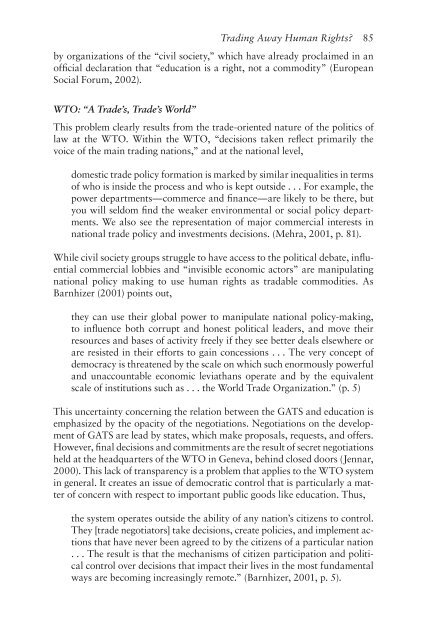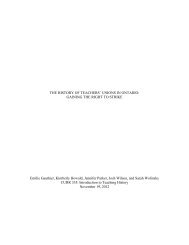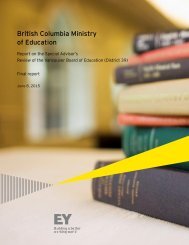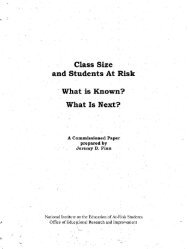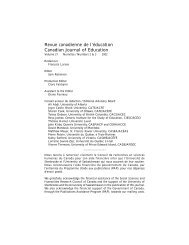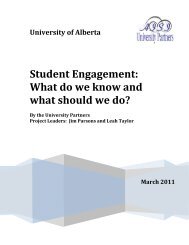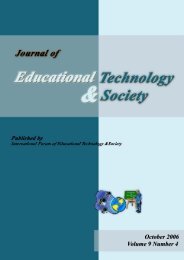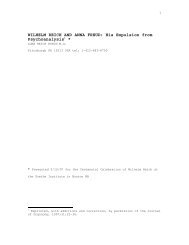- Page 4 and 5:
Global Neoliberalismand Education a
- Page 6 and 7:
ContentsForewordNICK GRANTAcknowled
- Page 8 and 9:
ForewordNick GrantON DELIGHT AND RE
- Page 10 and 11:
Foreword ixFor less than 5.5bn doll
- Page 12 and 13:
Foreword xicounterparts, UK politic
- Page 14 and 15:
Foreword xiiiNEOLIBERALISM’S GENE
- Page 16 and 17:
Foreword xvBut judged more from a c
- Page 18:
Foreword xviiHarvey, D. 2005. A bri
- Page 22 and 23:
1 IntroductionNeoliberal Capitalism
- Page 24 and 25:
Introduction 3“global corporate m
- Page 26 and 27:
Introduction 5diverse aspects of ne
- Page 28 and 29:
Introduction 7a theoretical and emp
- Page 30 and 31:
Introduction 9deregulation, more at
- Page 32 and 33:
Introduction 11Dee, H. ed. 2004. An
- Page 34 and 35:
Neoliberalism and Its Impacts 13cou
- Page 36 and 37:
Neoliberalism and Its Impacts 15of
- Page 38 and 39:
Neoliberalism and Its Impacts 17age
- Page 40 and 41:
Neoliberalism and Its Impacts 19spe
- Page 42 and 43:
Neoliberalism and Its Impacts 21pur
- Page 44 and 45:
Neoliberalism and Its Impacts 23Bac
- Page 46 and 47:
Neoliberalism and Its Impacts 256.
- Page 48 and 49:
Neoliberalism and Its Impacts 27. 2
- Page 50 and 51:
Neoliberalism and Its Impacts 29Rik
- Page 52 and 53:
Neoliberalism, Youth, and the Leasi
- Page 54 and 55:
Neoliberalism, Youth, and the Leasi
- Page 56 and 57: Neoliberalism, Youth, and the Leasi
- Page 58 and 59: Neoliberalism, Youth, and the Leasi
- Page 60 and 61: Neoliberalism, Youth, and the Leasi
- Page 62 and 63: Neoliberalism, Youth, and the Leasi
- Page 64 and 65: Neoliberalism, Youth, and the Leasi
- Page 66 and 67: Neoliberalism, Youth, and the Leasi
- Page 68 and 69: Neoliberalism, Youth, and the Leasi
- Page 70 and 71: Neoliberalism, Youth, and the Leasi
- Page 72 and 73: Neoliberalism, Youth, and the Leasi
- Page 74 and 75: Neoliberalism, Youth, and the Leasi
- Page 76 and 77: Higher Education and the Profit Inc
- Page 78 and 79: Higher Education and the Profit Inc
- Page 80 and 81: Higher Education and the Profit Inc
- Page 82 and 83: Higher Education and the Profit Inc
- Page 84 and 85: Higher Education and the Profit Inc
- Page 86 and 87: Higher Education and the Profit Inc
- Page 88 and 89: SIXTH VIRTUE: ATTRACTING INVESTMENT
- Page 90 and 91: Higher Education and the Profit Inc
- Page 92 and 93: Higher Education and the Profit Inc
- Page 94 and 95: 5 Trading Away Human Rights?The GAT
- Page 96 and 97: Trading Away Human Rights? 75trade
- Page 98 and 99: Trading Away Human Rights? 77a more
- Page 100 and 101: Trading Away Human Rights? 79on Eco
- Page 102 and 103: Trading Away Human Rights? 81princi
- Page 104 and 105: Trading Away Human Rights? 83the GA
- Page 108 and 109: Trading Away Human Rights? 87seen,
- Page 110 and 111: Trading Away Human Rights? 89for th
- Page 112 and 113: Trading Away Human Rights? 91The GA
- Page 114 and 115: Trading Away Human Rights? 93mechan
- Page 116 and 117: Trading Away Human Rights? 95are pr
- Page 118 and 119: Trading Away Human Rights? 97uneasy
- Page 120 and 121: Trading Away Human Rights? 99Subram
- Page 122 and 123: Trading Away Human Rights? 101. 198
- Page 124 and 125: Education, Inequality and Neolibera
- Page 126 and 127: Education, Inequality and Neolibera
- Page 128 and 129: Education, Inequality and Neolibera
- Page 130 and 131: Education, Inequality and Neolibera
- Page 132 and 133: Education, Inequality and Neolibera
- Page 134 and 135: Education, Inequality and Neolibera
- Page 136 and 137: Education, Inequality and Neolibera
- Page 138 and 139: Education, Inequality and Neolibera
- Page 140 and 141: Education, Inequality and Neolibera
- Page 142 and 143: Education, Inequality and Neolibera
- Page 144 and 145: Education, Inequality and Neolibera
- Page 146 and 147: Education, Inequality and Neolibera
- Page 148 and 149: 7 Brazilian Education, DependentCap
- Page 150 and 151: Brazilian Education, Dependent Capi
- Page 152 and 153: Brazilian Education, Dependent Capi
- Page 154 and 155: Brazilian Education, Dependent Capi
- Page 156 and 157:
Brazilian Education, Dependent Capi
- Page 158 and 159:
Brazilian Education, Dependent Capi
- Page 160 and 161:
Brazilian Education, Dependent Capi
- Page 162 and 163:
Brazilian Education, Dependent Capi
- Page 164 and 165:
Brazilian Education, Dependent Capi
- Page 166 and 167:
Brazilian Education, Dependent Capi
- Page 168 and 169:
Brazilian Education, Dependent Capi
- Page 170 and 171:
Brazilian Education, Dependent Capi
- Page 172 and 173:
8 World Bank Discourseand Policy on
- Page 174 and 175:
World Bank Discourse and Policy on
- Page 176 and 177:
World Bank Discourse and Policy on
- Page 178 and 179:
World Bank Discourse and Policy on
- Page 180 and 181:
World Bank Discourse and Policy on
- Page 182 and 183:
World Bank Discourse and Policy on
- Page 184 and 185:
World Bank Discourse and Policy on
- Page 186 and 187:
World Bank Discourse and Policy on
- Page 188 and 189:
World Bank Discourse and Policy on
- Page 190 and 191:
World Bank Discourse and Policy on
- Page 192 and 193:
9 The News Media and theConservativ
- Page 194 and 195:
The News Media and the Conservative
- Page 196 and 197:
The News Media and the Conservative
- Page 198 and 199:
The News Media and the Conservative
- Page 200 and 201:
The News Media and the Conservative
- Page 202 and 203:
The News Media and the Conservative
- Page 204 and 205:
The News Media and the Conservative
- Page 206 and 207:
RESULTSThe News Media and the Conse
- Page 208 and 209:
The News Media and the Conservative
- Page 210 and 211:
The News Media and the Conservative
- Page 212 and 213:
The News Media and the Conservative
- Page 214 and 215:
The News Media and the Conservative
- Page 216 and 217:
The News Media and the Conservative
- Page 218 and 219:
The News Media and the Conservative
- Page 220 and 221:
The News Media and the Conservative
- Page 222 and 223:
The News Media and the Conservative
- Page 224 and 225:
The News Media and the Conservative
- Page 226 and 227:
The News Media and the Conservative
- Page 228 and 229:
The News Media and the Conservative
- Page 230 and 231:
Markets and Education in the Era of
- Page 232 and 233:
Markets and Education in the Era of
- Page 234 and 235:
Markets and Education in the Era of
- Page 236 and 237:
Markets and Education in the Era of
- Page 238 and 239:
Markets and Education in the Era of
- Page 240 and 241:
Markets and Education in the Era of
- Page 242 and 243:
Markets and Education in the Era of
- Page 244 and 245:
Markets and Education in the Era of
- Page 246 and 247:
Markets and Education in the Era of
- Page 248 and 249:
11 Education in CubaSocialism and t
- Page 250 and 251:
Education in Cuba 229What threatens
- Page 252 and 253:
Education in Cuba 231The twisted lo
- Page 254 and 255:
Education in Cuba 233will eventuall
- Page 256 and 257:
Education in Cuba 235the fact that
- Page 258 and 259:
Education in Cuba 237social decay o
- Page 260 and 261:
Education in Cuba 239Expanding on t
- Page 262 and 263:
Education in Cuba 241has resulted i
- Page 264 and 265:
Education in Cuba 243crisis-ridden
- Page 266 and 267:
ContributorsPierrick Devidal holds
- Page 268:
Contributors 247Curry Malott is a P
- Page 271 and 272:
250 Indexeducationas antidote to un
- Page 273 and 274:
252 Indeximpact of fall of the Sovi
- Page 275 and 276:
254 IndexFairness and Accuracy in R
- Page 277 and 278:
256 Indexideology critique 110IFC s
- Page 279 and 280:
258 Indexinequality 120-1; loss of
- Page 281 and 282:
260 IndexSchmidt, George 192scholar
- Page 283 and 284:
262 IndexUnited Nations Development


